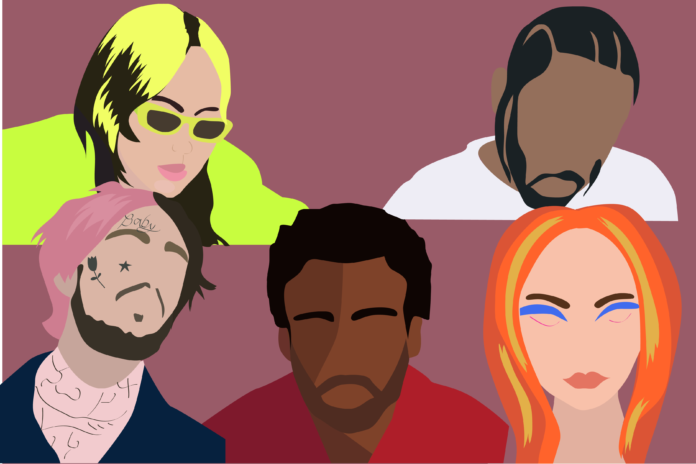Picking just one would be a disservice to the uniqueness of our generation
As our generation grows older, we often reminisce about the past. Even before the pandemic brought about this overwhelming amount of free time, we were watching nostalgic compilations on YouTube, making memes that were meant to “confuse the kid” and quoting “Spongebob Squarepants” like it was our life’s mission.
It’s no secret that music is the great unifier of many generations. When I think of the ‘70s, I think of The Grateful Dead. The late ‘90s invokes 2Pac and Nirvana. All of these artists come equipped with generational messages and moods, providing future generations with insights into the mindsets of those who lived in different decades and eras of sound. There’s a reason why history classes often provide audio clips of musical pieces during particular time periods — music is a significant aspect of history.
Who is the voice of our generation then? When we look back at our youth, to what message will we point? Who will future history classes listen to when trying to understand our lives? There are many moments and life-changing experiences through which our generation has lived. It’s hard to pinpoint just one standalone artist.
The millennial-zoomer age can be defined first by our unique relationship with the Internet and social media. We grew up with Club Penguin, which re-emerged recently as our saving grace in quarantine, Nyan Cat and the rise of the selfie. The Internet’s influence on music is similarly widespread. The ways in which the Internet has revolutionized the journey to musical fame is its most transformative impact on the music industry.
The idea that anyone can become a star by just posting online is revolutionary, to say the least. The general accessibility of this technology opens up worlds of opportunities for those who may not have connections in the industry — connections that would’ve once been critical to an aspiring artist’s musical success. Artists like Lil Peep, Dodie and XXXTentacion are just a few examples of the successes to come out of YouTube and Soundcloud.
High rates of depression are also a unique marker of our generation. According to CNN, “Depression is the leading cause of disability in the world.” As a result, part of our generational upbringing is characterized by the influx of mental health awareness and an emphasis on self care. The prevalence of face masks, meditation and positive affirmations are small-scale examples of this self-care revolution. There’s also increasing discourse surrounding mental health, which often manifests in music.
Billie Eilish documents her struggles with fame, Demi Lovato sings about her life post-rehab and Kid Cudi describes living with depression. These artists are household names, showing that mental health awareness is an important part of our generation’s identity.
Black voices are also critical to the fabric of our generation and have come to define today’s popular culture. From rap to pop, black artists set the trends in the music industry. The success of Megan thee Stallion’s “Hot Girl Summer” and Lizzo’s body positivity campaign are just two recent cases.
Kendrick Lamar’s “The Blacker the Berry” and 21 Savage’s “Nothin’ New” are both about navigating America and the Black Lives Matter movement as a Black man. These voices provide another view of life in America, one that isn’t tinted by rose-colored glasses. The fact that the most popular artists of our generation are Black and can speak about Black issues through their music shows the importance of artists utilizing their platforms to highlight their experiences and raise awareness.
Musical representation is also expressed in other demographics, like the LGBTQ+ community.
Janelle Monae’s “Make Me Feel” mentions a “sexual bender,” a play on the fluidity of sexuality and Monae’s own pansexuality. Arca, a nonbinary experimentalist artist, explains that her track “Nonbinary” is a reflection on how identifying as nonbinary is a freeing experience that “opens possibilities rather than collapsing things.” Kevin Abstract of Brockhampton uses his platform to address issues between the rap game and the LGBTQ+ community.
Music as a form of expression and especially in our generation opposes conformity. With so many audiences and means of communicating one’s music, the space for artists of our generation to speak and be heard is unparalleled. Attempting to determine the singular voice of our generation is futile. It’s impossible.
Written by: Isabella Chuecos — ifchuecos@ucdavis.edu
Disclaimer: The views and opinions expressed by individual columnists belong to the columnists alone and do not necessarily indicate the views and opinions held by The California Aggie











Uniqueness? This is the most conformist generation since the Greatest Generation. Just choose someone appropriately bland like Ed Sheeran and be done with it.